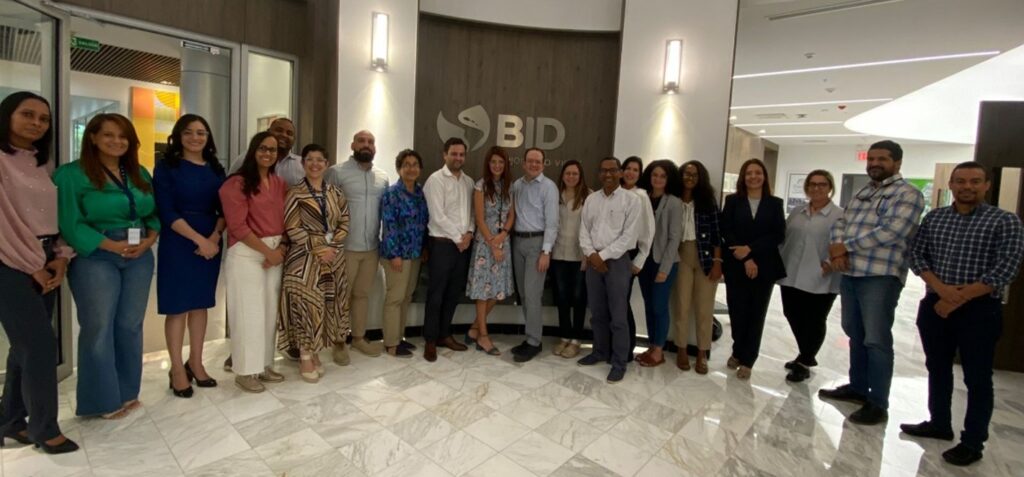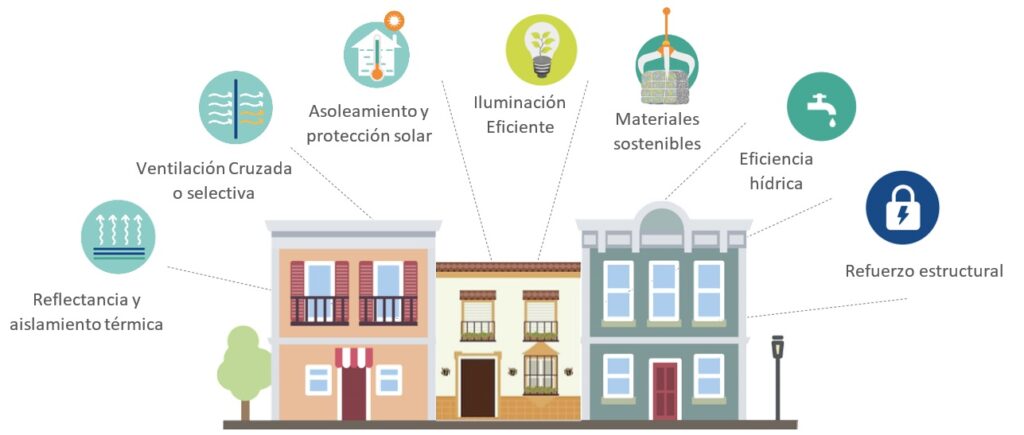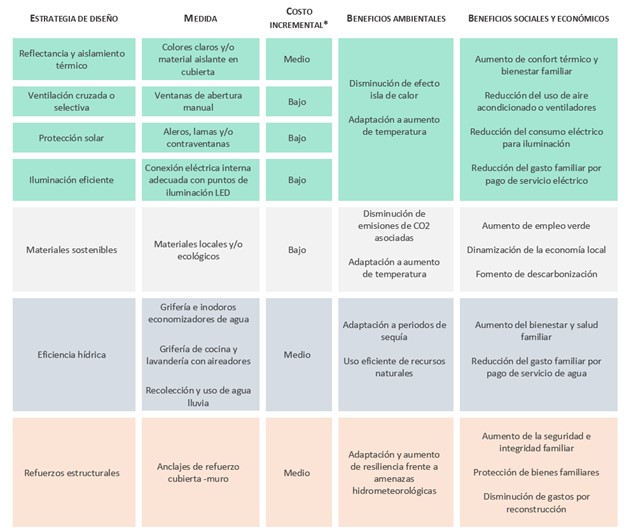Este artículo está también disponible en / This post is also available in: Spanish
The future is already here. The effects of global climate change are being felt severely in Latin America and the Caribbean (LAC): for example, forest fires are becoming more frequent, periods of drought are longer, and the duration and intensity of tropical storms have increased. Climate change threatens the future of our planet, but there is still time to adapt to it and mitigate its effects.
In cities, where nearly 80% of the region’s population lives, adaptation to climate change requires adapting buildings and urban infrastructure. As part of its commitment to the region’s development, the IDB is working with the countries and cities of LAC to solve the housing deficit in a sustainable manner that is adapted to climate change. One example is in the Dominican Republic, where the Integral Program for Tourism and Urban Development of the Colonial City of Santo Domingo (CCSD) is being implemented.
Keep reading to learn more about our work in the Dominican Republic and 3 lessons learned from this experience that can be replicated in other countries interested in carrying out social housing improvement plans with a focus on climate change adaptation and mitigation.
Housing shortage and low-quality housing, a regional problem
Access to decent housing is enshrined in the Universal Declaration of Human Rights. It is also considered a constitutional right in many countries. However, in LAC some 113 million people lack adequate housing.
At the Inter-American Development Bank, we are working to find a solution to this dramatic and urgent situation. In the Dominican Republic, we support the national government through the Integral Program for Tourism and Urban Development of the Colonial City of Santo Domingo (CCSD). One of the objectives of this program is to improve the living conditions of the most vulnerable households by intervening in 140 precarious dwellings with a focus on climate change adaptation and mitigation. To achieve this, strategies will be included to increase the resilience of the homes to disaster risks and climate change impacts, and the improvements will be carried out with sustainable construction criteria as a line of action towards the decarbonization of the construction sector.
Why adapt social housing in the Dominican Republic to the effects of climate change?
Climate change poses significant threats to all Caribbean states, including the Dominican Republic. Despite the differences among Caribbean nations, climate change poses serious threats to all of them. According to the IPCC, average temperatures in the Caribbean have increased by 0.1° to 0.2°C every decade over the past three decades. Rainfall patterns have also changed, and an increase in the number of consecutive dry days is expected. As a result, housing, as the main space for shelter and protection, must adapt to these new circumstances.
The construction of buildings in a sustainable and resilient manner is a global trend, which does not leave the Dominican Republic behind. It is being driven rapidly by increased concern about the impacts of climate change, but also by the search for healthier and more comfortable spaces prompted by the pandemic. As we become aware of the benefits of sustainable and resilient construction its demand is increasing.
Building homes with sustainability and resilience criteria has great benefits. Among them are increased health and well-being of occupants, inclusion of sustainable practices, and increased worker productivity.
Benefits of adapting social housing to the effects of climate change
The implementation of the Dominican Republic’s CCSD program has left us with three lessons learned in terms of improving social housing with a focus on climate change adaptation and mitigation. The following is a detailed account of these three lessons, which can serve as inspiration for the development of sustainable and climate-smart urban settlements in other cities in the region.
1. Institutional strengthening
The IDB Group is the best source of knowledge for designing instruments to expand opportunities for innovation in climate change and environmental sustainability in LAC. The IDB’s Housing and Urban Development Division, in particular, has positioned itself at the forefront in the generation, management and dissemination of knowledge in the fields of housing and urban development. Our accompaniment and training of executors, with an emphasis on green construction, continues to grow.
In the case of the Dominican Republic, the IDB accompanied program executors in CCSD with training actions, courses, workshops, and conferences, which allowed for the sharing of knowledge to strengthen response capacity and increase performance.
This type of institutional strengthening actions is an excellent opportunity to innovate and develop a more efficient construction sector in the region. This is why they play a key role in increasing the supply and demand for green and resilient buildings.

EDGE Introductory Workshop for program stakeholders in CCSD
2. Inclusion of sustainable practices:
Up to 80% of total disaster losses in LAC occur in urban areas, which also produce one third of regional greenhouse gas (GHG) emissions. Making cities more resilient to climate events and implementing the decarbonization of urban systems is a priority for climate action.
The CCSD program includes the definition of specific strategies to increase the resilience of housing to disaster risks and climate change impacts. It also addresses cost-effective measures for energy efficiency, water use and selection of low-carbon building materials that comprehensively enable compliance with international sustainable building standards, such as EDGE. EDGE is a free software created by the IFC that helps identify cost-effective strategies to reduce resource demand.

Own elaboration, adapted from the Green Buildings guide.

3. Generation of green jobs
The creation of green jobs linked to specific climate change strategies such as energy efficiency or renewable energies, for example, generates great opportunities to boost the local economy as well as promote a positive impact on poverty reduction and progress towards a more equitable and sustainable society. To this reference, according to an IDB study, a key finding in the region is that most of the jobs that require green skills are not traditional green jobs, i.e. they do not necessarily require a university degree but rather skills through on-the-job training, technical education, on-the-job learning, technical certification programs, among others.
This demonstrates the need to increase these skills in different sectors of the economy. The CCSD program, since its preparation, has contributed to the generation of green skills in the work teams, from the identification of opportunities as well as the collection of data and information for the analysis of energy and water performance. It is expected that the implementation phase of the program will develop other skills such as suppliers or installers of eco-technologies, green works supervisors, trained labor, certified construction assistants, among others.

Data and Information Collection Team
IDB studies assure that living in carbon-free spaces will be cheaper and more comfortable. In this scenario, planning the reuse of existing housing stock, and applying green and resilient design practices represents a great opportunity for the development of sustainable cities, contributing to face the challenges of climate change and joining the efforts to meet the goals agreed in the Paris Agreement.
Is your city ready to adapt social housing to the effects of climate change?
At the IDB’s Housing and Urban Development Division we work to improve lives in cities and countries in the region. If you are interested in implementing social housing improvement plans with a climate change adaptation approach in your municipality, please do not hesitate to write to us. We will be happy to hear your case and see how we can support you.
In the meantime, we encourage you to register here to receive our monthly newsletter and not miss blogs, courses and publications from the Housing and Urban Development Division of the IDB.


Leave a Reply